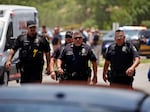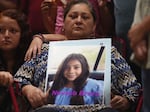
Police walk near Robb Elementary School following the shooting on Tuesday.
Dario Lopez-Mills / AP
Even before details were known about the shooter who killed 19 children and two school faculty at Robb Elementary School in Uvalde, Texas, fringe media were awash in rumors, conspiracy theories and misinformation.
Some posts incorrectly identified the shooter, while others posited without evidence that the massacre was a government-orchestrated "false flag" operation.
With the tragic events following closely on the heels of another mass shooting in Buffalo, New York, the online discussions reverted to unfounded narratives and scapegoats that have become all too familiar as the country grapples with the continued toll of gun violence.
"This is the worst case scenario. Without a manifesto and a known motive, the speculation is just going to get worse and worse as to what drove the shooter to do it," said Sara Aniano, an extremism researcher who focuses on the rhetoric of the far right on social media. "But it also provides a really fertile ground for more conspiracy theories to sort of accumulate and spread in the information ecosystem."

Crosses adorn a makeshift memorial for the shooting victims at Robb Elementary School. NPR has not independent verified the names.
CHANDAN KHANNA / AFP via Getty Images
Conspiracy theories
Just as happened after the January 6th attack on the U.S. Capitol and the recent Buffalo shooting, conspiracy theorists aired unfounded claims that the tragedy was the result of a government plot.
On Gab and Telegram and other fringe platforms where the far right gather, many asserted without evidence that it was a "false flag" operation staged by federal authorities to justify tighter control of guns, or to deflect from other news stories.
"Sometimes that manifests as accusations of there being crisis actors, similar to [false accusations like] what we saw post-Sandy Hook," said Aniano, referring to the 2012 shooting at a Connecticut elementary school that killed 20 children and 6 staff.
One of the more obscure narratives that animated some of these unfounded accusations involved a secret project that ended in 1973, called MK-ULTRA. In that program, the CIA sought methods of mind control on human subjects through the use of LSD or psychological torture.
After the shooting in Uvalde, some took to social media with baseless inferences to suggest that the program was somehow accountable for the gunman's violence.
Scapegoats
Among the most dangerous narratives that gained wide circulation within the far right were those that spread incorrect claims about the shooter's identity.
Quickly after the gunman's name was announced, users on 4chan, GETTR, Patriots.win and other fringe platforms labeled him an "illegal alien." In a press conference on the day of the shooting, Texas Governor Greg Abbott identified him as a U.S. citizen.

A woman holds a photo of Nevaeh Bravo, who was killed on Tuesday.
ALLISON DINNER / AFP via Getty Images
Users also quickly mislabeled the shooter as transgender – even going so far as to misidentify him with photos of another transgender individual who was completely unconnected to the events.
"[That] false claim... it really had legs, like [it] really spread around in the far right," said Alex Kaplan, a senior researcher at Media Matters. "You had Alex Jones sharing it, you had Andrew Torba [sharing it]. It reached Congressman Paul Gosar."
Gosar, who faced backlash for spreading the false information, later deleted his tweet.
There is no evidence that the shooter was transgender, but even the unfounded claim itself prompted alarm that the claim would ignite further violence against LGBTQ individuals.
"This comes as there has been this... anti LGBTQ campaign to basically claim that... gay people or teachers are 'grooming' children, or that transgender people are targeting children," Kaplan noted.
The individual who was incorrectly identified posted on their Reddit profile page: "It's not me, I don't even live in Texas."
The legacy of Alex Jones
Much of the reaction on the far right to acts of public or mass violence has become a kind of standard playbook, with false flag claims and even a denial that the violence was real.
But researchers note that the far right reaction to the tragedy in Uvalde was different from that which followed the shooting at Sandy Hook Elementary School in one key way. At that time, the conspiracy theories largely originated from one figure: Alex Jones, of the far right media platform Infowars.

Alex Jones, the founder of right-wing media group Infowars.
Jon Cherry / Getty Images
Jones recently lost defamation suits tied to his false claim that the massacre was a hoax. He is now filing for bankruptcy.
While Jones did amplify baseless conspiracy theories after the Uvalde shooting, those narratives bubbled up in a much more anonymous, grassroots fashion than they did 10 years ago.
Extremism researchers say this demonstrates the degree to which Jones's fringe thinking has taken root among a certain swath of the public.
"Once those seeds are planted, they can't really be uprooted," Aniano said. "It's been almost 10 years now since Sandy Hook, and look where we're at."
Copyright 2022 NPR. To see more, visit https://www.npr.org.